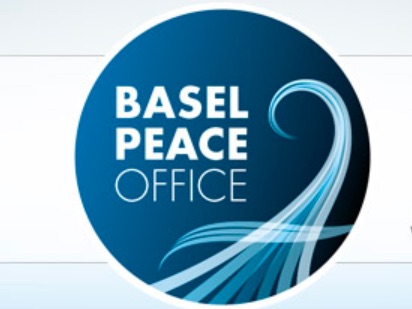.. DEMOCRATIC PARTICIPATION ..
A press release from the Basel Peace Office
Mayors, parliamentarians, policy experts and civil society representatives from forty countries – mostly Europe and North America – yesterday [January 29] sent an open letter, the Basel Appeal for Disarmament and Sustainable Security, to Presidents Putin and Trump and to the leaders of the Russian and US legislatures, calling on them to preserve the Intermediate Range Nuclear Forces (INF) Treaty, prevent a new nuclear arms race in Europe and undertake measures to reduce the risk of a nuclear conflict and support global nuclear disarmament. (Appeal also available in French, German, Russian and Spanish).

The INF Treaty is an historic agreement reached in 1987 between the United States and the Soviet Union to eliminate all of their nuclear and conventional ground-launched ballistic and cruise missiles with ranges of 500 to 5,500 kilometers, and to utilize extensive on-site inspections for verification of the agreement.
Following President Trump’s 20 October, 2018 announcement of his intent to withdraw the United States from the INF Treaty, the State Department has signaled that the US will suspend implementation of the treaty beginning 2 February 2019 and commence the six-month withdrawal process. If the Treaty is dissolved it would further stimulate the current nuclear arms race. In particular, it would open the door for intermediate-range, ground-based nuclear-armed missiles returning to Europe and for US deployment of such missiles in Asia.
‘We are extremely concerned about the deteriorating security environment in Europe and internationally which led the Bulletin of the Atomic Scientists to last week re-set the Doomsday Clock at 2 Minutes to Midnight,’ says Christine Muttonen (Austria), Co-President of Parliamentarians for Nuclear Non-proliferation and Disarmament.
‘Conflicts over the INF Treaty should be resolved through the Treaty, not by abandoning it. And other conflicts should be resolved through diplomacy and common security mechanisms such as the United Nations and the Organisation for Security and Cooperation in Europe (OSCE),’ said Ms Muttonen, who recently served as the President of the OSCE Parliamentary Assembly. ‘They cannot be resolved by elevating nuclear threats and ratchetting up the arms race.’
(continued in right column)
How can parliamentarians promote a culture of peace?
How can culture of peace be developed at the muniipal level?
(continued from left column)
‘Mayors and parliamentarians, especially those of us from Europe, will not sit idly on the side while the US and Russia erode our security,’ said Thore Vestby (Norway), Vice-President of Mayors for Peace and a former member of the Norwegian parliament. ‘Cities and parliaments are therefore taking action to support nuclear arms control treaties such as the INF and START treaties, promote additional measures such as no-first-use and the new Treaty on the Prohibition of Nuclear Weapons, and to put an end to city and state investments in nuclear weapons corporations.’
‘Legislators in nuclear armed States have a specific role to prevent authorization and funding for new more sophisticated and usable nuclear weapons that increase the risk of destruction of humanity by accident, miscalculation or intent,’ said Paul Quiles (France), Mayor of Cordes sur Ciel, President of Initiatives pour le Désarmement Nucléaire, and Former Defence Minister of France.
‘The fact that the President of the US Conference of Mayors is among 18 US mayors who endorsed on short notice is a significant indicator that ‘Main Street USA’ opposes the Administration’s destabilizing and expensive nuclear weapons program and supports proactive efforts to achieve a nuclear-weapon-free world’’ said Frank Cownie, Mayor of Des Moines, Iowa and Vice-President of Mayors for Peace.
‘We do not want to see the dark days of Cold War conflagrations of the 1980s return to Europe. All effort is required to maintain a productive nuclear weapons disarmament regime so that we don’t see the return of nuclear weapons across the continent,” said Councillor David Blackburn, Chair of UK & Ireland Nuclear Free Local Authorities. ‘I urge the United States and Russia to go back to the diplomatic table and not seek to build a new generation of dangerous nuclear weapons’
‘Nuclear weapons and climate change pose an existential threat to current and future generations,’ says Dr Andreas Nidecker MD (Switzerland), President of the Basel Peace Office. ‘The massive amount of spending in nuclear weapons – over $100 billion per year – should instead be spent in areas which increase our security – such as diplomacy, climate protection and the Sustainable Development Goals.’
‘Diplomacy is starting to work on the Korean peninsula with North and South building cultural, sporting and other contacts despite their political differences,’ said Alyn Ware (Czech Republic), PNND Global Coordinator and Member of the World Future Council. ‘We give full support to the Korean peace and denuclearization process and we call on US, NATO and Russia to follow a similar diplomatic approach with regard to their conflicts, and to help achieve global nuclear disarmament.’
Background
Renew Nuclear Arms Control, Don’t Destroy It. By Andrew Lichterman and John Burroughs
Who lost the INF Treaty? by Pavel Podvig, Bulletin of the Atomic Scientists;
Parliamentary action to preserve the Intermediate Nuclear Forces (INF) Treaty, PNND.